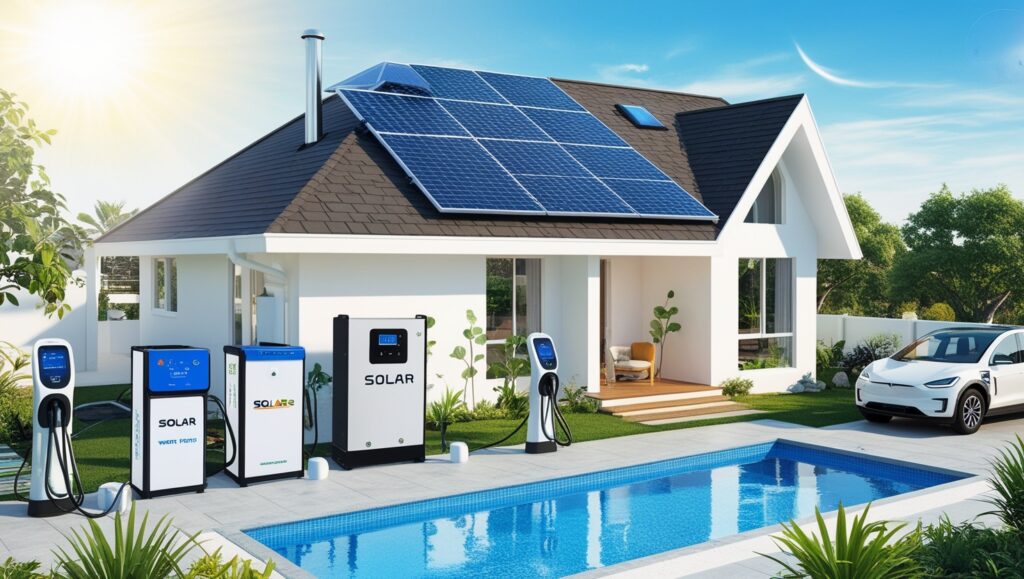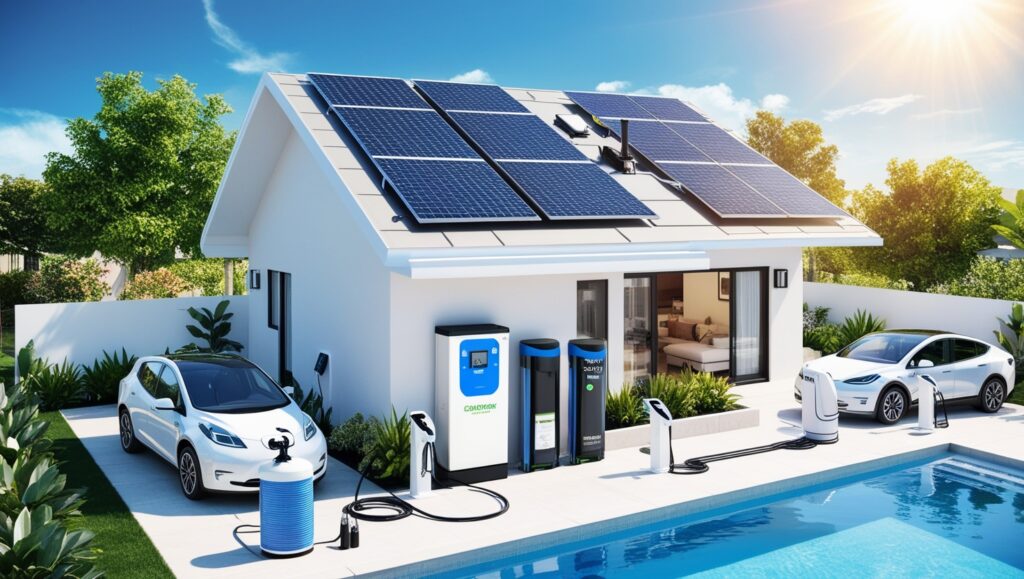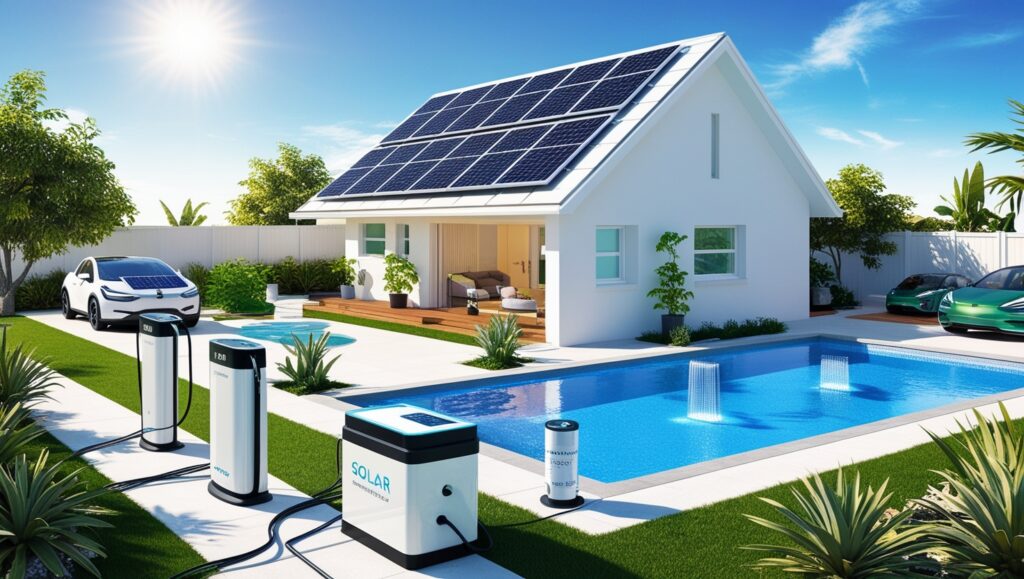Introduction: The Power of Solar Energy
In today’s rapidly evolving world, homeowners are increasingly looking for alternative energy solutions to counteract rising electricity costs and address growing environmental concerns. Traditional energy sources—often reliant on fossil fuels—have become expensive and unsustainable, prompting a shift toward cleaner, renewable energy options. Among these, solar energy stands out as one of the most powerful and accessible solutions available. It not only offers a way to significantly reduce your energy bills but also contributes to a cleaner, more sustainable planet by reducing reliance on nonrenewable resources.
If you’ve been considering making the switch to solar power, you’re in good company. Millions of homeowners around the world are already harnessing the power of the sun to meet their energy needs, and the numbers continue to grow. Solar energy has become more affordable and efficient than ever, offering a viable option for reducing electricity costs while helping protect the environment.
In this comprehensive guide, we’ll walk you through practical tips and strategies for saving money with solar energy in 2024. Whether you’re thinking about installing solar panels on your home, looking to optimize your existing solar system, or simply interested in adopting energy-saving habits, this article is designed to show you how to make the most of solar power. From understanding the financial incentives available to you to discovering actionable steps that can help you maximize your savings, we’ve got all the information you need to get started on your solar journey.

1. Why Solar Energy is a Smart Investment
Before diving into the specifics of how solar energy can save you money, it’s important to understand why it’s considered a smart long-term investment for homeowners. Solar energy isn’t just about cutting down on electricity bills—it’s about gaining financial independence, making a positive environmental impact, and securing a sustainable future. Let’s take a closer look at why investing in solar energy is a wise decision.
Lower Electricity Bills
The most immediate benefit of installing solar panels is the significant reduction in your monthly electricity bills. Solar panels generate electricity from the sun, providing free, renewable energy to power your home. By relying less on utility companies, you can lower or even eliminate your monthly electric bills. This is especially beneficial in areas with high electricity rates, where solar energy can offset a large portion of your energy consumption.
While the initial installation of solar panels requires an upfront investment, the long-term savings from reduced energy costs can quickly outweigh the initial expenses. Over time, your system will essentially pay for itself, and after a few years, you’ll enjoy the full benefits of free energy.
Energy Independence
One of the greatest advantages of solar energy is the ability to reduce your dependence on traditional energy sources. Utility companies often raise their prices, leaving homeowners with little control over their energy costs. By installing a solar energy system, you gain more control over how much energy you use and how much you pay for it.
With solar panels, you can generate your own electricity, which means you’re not as vulnerable to market fluctuations or price hikes. Additionally, with the addition of solar batteries, you can store the excess energy your system generates during the day and use it at night or during power outages. This added energy security reduces your reliance on the grid, giving you more autonomy over your home’s energy needs.
Environmental Benefits
Solar energy is one of the cleanest and most sustainable energy sources available. Unlike fossil fuels, solar power doesn’t emit harmful pollutants into the atmosphere. By installing solar panels on your home, you’re making an important contribution to reducing the overall carbon footprint. Solar power is renewable, meaning it will never run out as long as the sun shines. This makes it a reliable long-term energy solution.
Moreover, the environmental benefits of solar energy go beyond just reducing greenhouse gas emissions. Solar panels also reduce the need for energy from coal and natural gas plants, which are major contributors to pollution and climate change. By embracing solar energy, you’re helping to combat climate change and preserve the planet for future generations.
Government Incentives and Tax Credits
One of the most compelling reasons to invest in solar energy today is the financial incentives available through government programs. Many regions, including the U.S. and parts of Europe, offer attractive incentives, tax credits, and rebates to help homeowners offset the initial cost of solar panel installation.
For instance, the U.S. offers a federal tax credit that can cover up to 30% of the cost of installing solar panels, which can drastically reduce the upfront cost. Additionally, some states and local governments provide additional financial incentives, such as rebates or performance-based incentives, further reducing the overall cost of installation.
In some cases, utility companies may offer special programs to homeowners who install solar panels, such as net metering, where homeowners are compensated for the extra energy they produce and feed back into the grid. These incentives not only make solar energy more affordable in the short term but also increase the long-term return on investment.
Long-Term Return on Investment (ROI)
While the initial installation of solar panels can be costly, the long-term financial benefits make it a solid investment. Solar panels typically have a lifespan of 25–30 years, and most come with warranties that guarantee performance for at least 10–20 years. Over the years, the savings on electricity bills can quickly surpass the initial cost, meaning you’ll enjoy years of free or significantly reduced electricity costs.
As energy prices continue to rise, your savings will only increase. In fact, many homeowners find that their solar systems pay for themselves within 6–10 years, after which they can reap the financial rewards for decades to come. Additionally, solar panels can increase the value of your home, making it a more attractive option for future buyers who are looking for energy-efficient homes.

2. How to Save Money by Installing Solar Panels
The most significant way to save money with solar energy is to install solar panels on your home. Here’s how you can maximize your savings:
2.1. Choose the Right System Size
The size of your solar panel system is directly related to the amount of electricity it can generate. To save money, you’ll want to install a system that matches your energy needs.
- Smaller Systems: Ideal for homes with low energy consumption, a smaller system is more affordable upfront and can still significantly lower electricity bills.
- Larger Systems: If your home uses a lot of energy, a larger system will be more efficient at reducing your reliance on the grid.
Work with a solar installer to assess your energy consumption and determine the optimal system size for your home.
2.2. Look for Incentives and Rebates
Depending on where you live, you may qualify for various incentives and rebates that can drastically reduce the cost of installing solar panels.
- Federal Tax Credit: In many countries, homeowners can claim a tax credit for a percentage of the cost of their solar panel system. As of 2024, the U.S. offers a 30% federal tax credit for residential solar installations.
- State and Local Incentives: Many states or local governments offer additional financial incentives, such as rebates, which further reduce the upfront cost.
Don’t forget to research local incentives to ensure you’re taking full advantage of potential savings.
2.3. Finance Your Solar System Wisely
There are a variety of financing options available to help homeowners pay for solar panel installation:
- Solar Loans: These allow you to pay for your solar system in installments, making it easier to afford the upfront cost while still benefiting from savings.
- Solar Leases and Power Purchase Agreements (PPAs): With these options, you can install solar panels without a large upfront cost. However, you’ll usually pay a fixed monthly fee or a rate for the power generated, which can still result in savings over time.
Make sure to compare different financing options to choose the one that best suits your budget and savings goals.
3. Optimize Your Solar System for Maximum Savings
Installing a solar system is a great first step toward reducing your energy costs and living more sustainably. However, to fully maximize the financial benefits of your solar energy setup, it’s important to optimize its performance. By implementing a few key strategies, you can ensure that your system is working as efficiently as possible and that you’re saving the most money.
3.1. Monitor Your Energy Usage
One of the first steps in optimizing your solar system is to regularly monitor your energy consumption. Many modern solar systems come with apps or monitoring tools that give you access to real-time performance data, allowing you to track how much energy your system is generating and how much you’re using.
By staying on top of your energy usage, you’ll have a clear understanding of when your solar system is producing enough power to meet your needs and when you’re relying on grid electricity. You can identify patterns in your energy consumption and make adjustments to your habits, such as running appliances during the day when your solar system is at its peak, or reducing usage during the evening when solar energy is no longer available.
With these insights, you can fine-tune your energy habits to ensure you’re using as much of your own solar energy as possible, rather than relying on expensive grid electricity.
3.2. Consider Battery Storage
To take your solar savings to the next level, consider adding a solar battery to your system. A solar battery stores excess energy that is generated during the day, which you can then use at night, on cloudy days, or during peak electricity periods when rates are higher. This can significantly reduce your reliance on the grid and help you save more money in the long run.
By using stored energy during periods when electricity prices peak (typically in the evening or during high-demand periods), you avoid paying higher rates for grid power. This makes your solar system even more cost-effective, especially if you’re in an area with time-of-use rates that charge higher prices during certain hours. Over time, this can add up to substantial savings, making the initial investment in a solar battery worthwhile.
3.3. Use Energy-Efficient Appliances
Reducing your overall energy consumption is another critical step in maximizing your solar savings. The more energy-efficient your home is, the less electricity you’ll need to generate from your solar panels. By upgrading to energy-efficient appliances, you can lower your household’s total energy demand, which means your solar system will be able to meet your needs more easily.
Start with small upgrades, such as switching to LED bulbs, which use a fraction of the energy consumed by traditional incandescent bulbs. Invest in Energy Star-rated appliances, which are designed to use less electricity while providing the same performance. Additionally, consider installing smart thermostats that optimize your heating and cooling systems based on your habits and preferences, further reducing energy waste.

4. Monitor Your Solar System’s Performance
To maximize the benefits of your solar energy system, it’s essential to ensure that your panels are consistently working at their optimal capacity. Regular monitoring and maintenance are key to preventing performance issues and maximizing the savings you can achieve. Here are some practical tips to help you keep your solar system in top shape:
4.1. Clean Your Panels
One of the simplest yet most effective ways to maintain your solar system’s efficiency is by keeping your solar panels clean. Over time, dust, dirt, leaves, and other debris can accumulate on the surface of the panels, reducing the amount of sunlight they can absorb. This, in turn, lowers their overall energy output.
To clean your panels, use a soft cloth or a sponge with mild soap and water. Avoid using harsh chemicals or abrasive materials that could damage the panels. In regions with frequent dust storms or heavy rainfall, cleaning your panels every few months may be necessary. For areas with minimal dirt buildup, cleaning them once or twice a year could be sufficient.
By ensuring your panels are free of debris, you allow them to absorb more sunlight and generate more energy, which ultimately increases your savings.
4.2. Check for Damage
Inspecting your solar panels for any damage is an essential part of maintaining your system. Even small issues like cracks, scratches, or loose connections can affect the efficiency and lifespan of your panels. Additionally, excessive shading from nearby trees, buildings, or other obstructions can reduce the amount of sunlight hitting the panels, impacting energy production.
Take a quick walk around your system to check for visible damage, such as broken glass, loose wiring, or any signs of wear. If you notice any issues, contact a professional solar technician for repair. Additionally, keep an eye on your panels for signs of shading, and trim nearby trees or vegetation to ensure that nothing is obstructing the sunlight.
Regularly checking for damage and addressing shading issues will help ensure that your solar system is performing at its full potential.
4.3. Schedule Professional Inspections
While daily or weekly checks can help you spot any obvious issues, scheduling an annual professional inspection is highly recommended. A qualified solar technician can inspect the entire system, including the inverter, wiring, and batteries, to ensure everything is functioning correctly. They can also identify potential issues that may not be immediately visible, such as wear and tear on components or changes in system performance.
A professional inspection can help catch problems early, before they become costly repairs or cause significant energy loss. Many solar companies offer maintenance packages or warranties that include annual inspections. Taking advantage of these services can save you money in the long run and extend the lifespan of your solar system.
5. Beyond Solar Panels: Other Ways to Save Money with Solar Energy
While installing solar panels is the most common and effective way to cut down on energy costs, there are other innovative ways to maximize your savings by tapping into the power of the sun. Let’s explore some additional solar solutions that can further reduce your reliance on grid electricity:
5.1. Solar Water Heating
One of the best ways to reduce your energy bills beyond solar panels is by installing a solar water heater. Traditional water heating methods can account for a significant portion of your monthly energy expenses. Solar water heaters use the sun’s free energy to heat water, which can then be used for your daily needs such as showers, washing, and cleaning.
There are two main types of solar water heaters:
- Active solar water heaters: These systems use pumps to circulate water through the solar collector and into a storage tank.
- Passive solar water heaters: These are simpler systems that rely on natural convection to move water through the system.
By switching to solar water heating, you can significantly reduce or even eliminate the need for electricity or gas-powered water heaters, leading to long-term savings on your utility bills.
5.2. Solar Pool Heating
If you have a swimming pool, you’re likely familiar with the high costs of heating it. Traditional pool heaters can be expensive to operate, especially if you’re using gas or electricity to warm the water. Solar pool heating offers an eco-friendly and cost-effective alternative.
Solar pool heaters use solar panels to capture the sun’s energy, which is then used to circulate water through the pool’s system, keeping the pool warm. Not only does this save you money on electricity or gas bills, but it also extends your swimming season, allowing you to enjoy your pool even during cooler months.
5.3. Combining Multiple Solar Solutions
By integrating a variety of solar-powered systems into your home, you can maximize your savings and reduce your dependence on the grid. Solar water heating and solar pool heating are just two examples of how you can complement your solar panel system with other renewable energy solutions. This holistic approach ensures you’re making the most of the sun’s energy to power your home and reduce your overall energy costs.
For instance, combining solar panels with battery storage systems allows you to store excess energy for later use, which can be particularly useful during peak hours when electricity prices are higher. Similarly, by using energy-efficient appliances alongside solar energy, you can further reduce your energy consumption and the size of the system you need to install.ar panel installation, financing options, and everything you need to take advantage of solar energy in 2024!
If you’re ready to lower your energy bills and start saving with solar, check out Luminexa Solar’s expert guides and reviews to find the best solar solutions for your home today!










1 thought on “How to Save Money with Solar Energy”
Comments are closed.